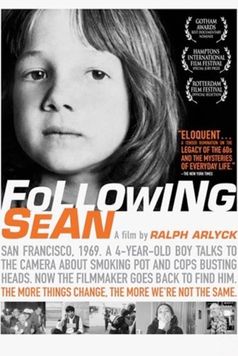
Following Sean
The more things change, the more we're not the same
The more things change, the more we're not the same
Documentary
-
2006
Add to Watchlist
Add to Seenlist
Add to Blacklist
Add to or remove from a custom list
Filmmaker Ralph Arlyck first met Sean while living as a graduate student in Haight Ashbury at the height of the 1960s. The city was awash with the trappings of America’s cultural revolution-the San Francisco State University campus flooded with cops in riot gear, the Haight filled with drifters and idealists, and, on the third floor of Arlyck’s building, a come-one-come-all crashpad apartment. It was from this top floor commune that the precocious 4-year-old Sean would occasionally wander downstairs to visit and talk-and one day Arlyck turned on his camera. Sean’s casual commentary on everything from smoking pot to living with speed freaks was delivered in simple sincerity throughout the soon-to-be famous 15-minute film. This First Child of the notorious decade may have shaken the audience with his simple sentence- “Sure, I smoke pot”-but it was his barefoot impishness which would encapsulate the hope that lay in front of the nation: a promise of infinite possibility.
Director:
Cast:
Similar
Same Director
Details
Rated:
Unrated
Runtime:
87 min
Release date:
5 May 2006
Country:
US
Budget:
$0
Revenue:
$0
Awards:
3 nominations.
Top Critics Reviews
fresh:
Arlyck's compulsion is to our great fortune. Patient and elegant, his film is a quietly devastating meditation on family, work, and the unrelenting passage of time.
– Drew Tillman,
Village Voice,
2 May 2006
fresh:
Ralph Arlyck's ruminative essay film picks up the trail of Sean Farrell, the former child of San Francisco hippies and the subject of his 1969 short film Sean.
– Nathan Lee,
New York Times,
2 May 2006
rotten:
Arlyck spends more time following himself and his own lefty family than checking up on Sean.
– V.A. Musetto,
New York Post,
3 May 2006
fresh:
What emerges from Arlyck's musings is a penetrating cinematic essay on how generations in the last century struggled to take hold of history and reconfigure the shape of daily life.
– Gene Seymour,
Newsday,
3 May 2006
fresh:
Part of the film's charm lies in its evocation of a generational mural that includes old Marxists, flower children and the progeny of red-diaper babies.
– Steven Mikulan,
L.A. Weekly,
18 May 2006



